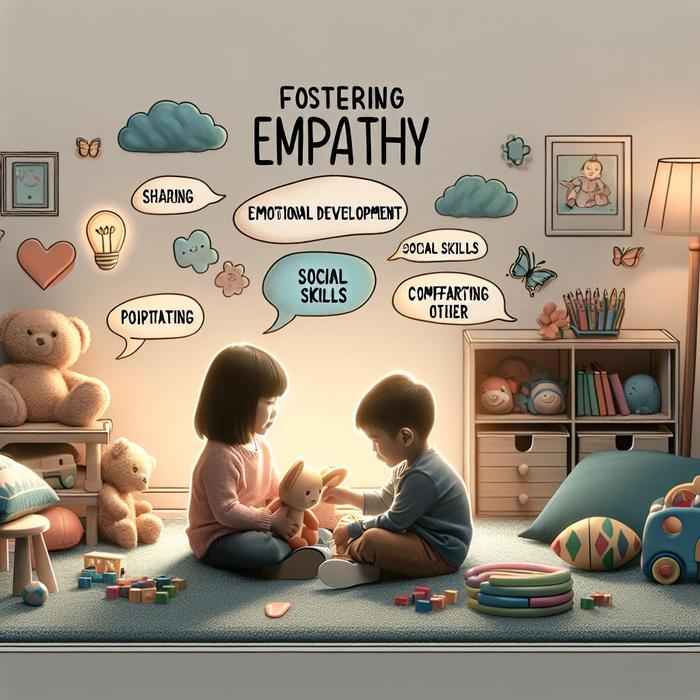Understanding the Importance of Fostering Empathy in Your Toddler
Developing social skills in early childhood significantly contributes to a child’s emotional and psychological growth. Fostering empathy, an essential social skill, plays a pivotal role in promoting positive behavior and emotional development in toddlers. In this blog post, we will explore several activities and techniques to help nurture empathy in your little one.
Using Empathy Activities to Guide Emotional Development
Actively engaging your child in empathy activities can profoundly impact their understanding of emotions, both their own and others’. Research suggests that children who take part in empathy-related games and tasks often exhibit a higher capacity for emotional intelligence later in life.
- Child’s Play in Action provides a wide range of empathy activities for children, designed to offer real-world practice in empathy and comprehension.
- Check out the LinkedIn post by Jocelyn Greene, where she shares several interesting empathy activities that will not bore kids at all.
- In addition, Very Special Tales offers printable empathy activities for young kids that instill kindness and emotional understanding.
Adapting Techniques for Fostering Empathy
While using empathy activities is beneficial, modifying your parenting techniques to foster empathy is equally important. It involves incorporating empathy into daily scenarios, improving communication, and demonstrating empathy in your behavior.
- Praise positive behavior: Acknowledge when your toddler demonstrates empathy, reinforcing the positive behavior. For instance, if they share a toy with another child, highlight their act of kindness.
- Express your emotions: Consider expressing your feelings openly. By explaining your emotions, you present your child with an opportunity to understand and empathize with your feelings.
- Show empathy towards your child: Show your child what empathy looks like by being empathetic towards their feelings. This includes validating their emotions and providing comfort during distressing times.
- Practice patience: Understand that emotional development takes time and patience. It’s a step-by-step process.
Consulting Resources to Understand the Process
There are numerous resources available to guide parents on fostering empathy in their children. Reddit, communities like r/Preschoolers, provide a platform for parents to share experiences and advice. Reading experiences of other parents can offer you fresh insights and techniques to try with your child.
Relating Empathy with a Child’s Nutrition
Believe it or not, your child’s diet can impact their emotional development. A nutritious diet contributes to their overall health, including their emotional well-being. Making an effort to include diverse and healthy foods in your child’s diet can supplement their development journey. For comprehensive guidance, you can explore nutritious toddler lunch ideas on our website.
In conclusion, fostering empathy in your toddler is a multifaceted process. It requires conscious efforts, patience, and love. Remember that every child is unique and that there is no one-size-fits-all approach. Adapt and use techniques and activities that work best for your child.
The Impact of Media on Your Toddler’s Emotions
Today’s children are growing up in an exceedingly media-saturated world. Television shows, films, and varying types of digital media form a significant part of their lives. This exposure, when curated appropriately, can have a positive effect on fostering empathy. Programming that demonstrates pro-social behavior or offers a diversity of situations and emotions can aid your child in understanding and mirroring such conduct. Check out these recommendations for educational shows that foster empathy.
Empathy-Enriching Literature for Kids
Reading or narrating age-appropriate books that touch on emotions can be an excellent tool for instilling empathy. Stories about love, friendship, sharing, and caring can help children connect with others’ feelings. If you are on the lookout for foundation-enhancing literature, these empathy worksheets available at PositivePsychology.com come highly recommended for their ability to effectively combine play and learning.
Empathy Enhancing Games
Toddlers are like little explorers, forever ready to learn, try new things, and, most importantly, play. Simple games focusing on emotions and empathy can aid their emotional growth. Games like “Emotion Charades,” where children enact various feelings, or “Empathy Puzzles” can be educational and enjoyable simultaneously. For a list of fun and simple empathy-fostering games, check out this great resource.
Affirmations for Fostering Empathy in Kids
Positive affirmations for empathy can be influential in nurturing an emotionally intelligent child. Make these affirmations a part of your child’s routine – let them begin or end their day by repeating them aloud. They work by emphasizing the importance of understanding, compassion, and care in day-to-day interactions. Understood.org provides a collection of empathy-building affirmations that can be beneficial.
Final Thoughts
Helping your child develop empathy is a blessing in disguise. It not only aids in nurturing emotionally intelligent individuals, but also enables them to build better bonds and solve conflicts amicably. Practice the techniques and activities mentioned above, make empathy an actionable part of your life, and watch your toddler grow into a sensitive, thoughtful, and emotionally aware person.
Empathy: A Guide for Parents
Parenting does not come with an instruction manual, but the experiences of others can serve as one. Feel free to refer to the provided resources and revisit this blog post for more insights. As a parent, you play the most crucial role in your child’s journey towards becoming a compassionate, empathetic individual. Stay patient, be open, utilize these strategies, and witness the transformation of your toddler as they step into the intricate world of emotions with empathy.






